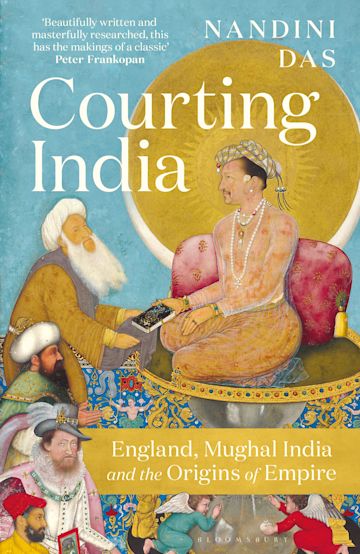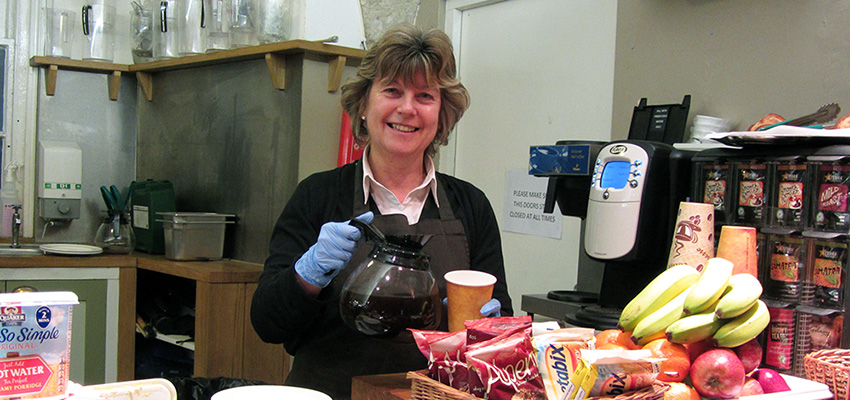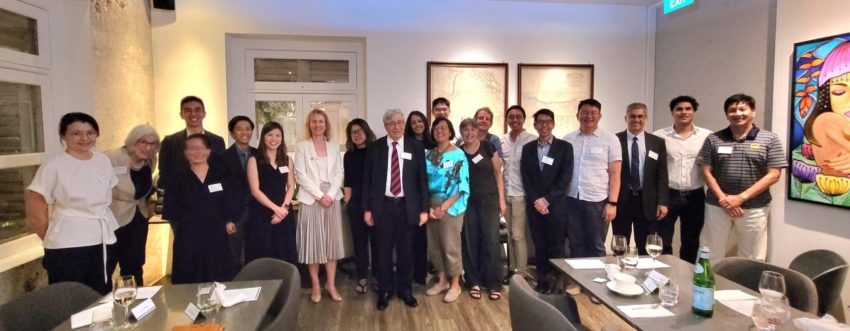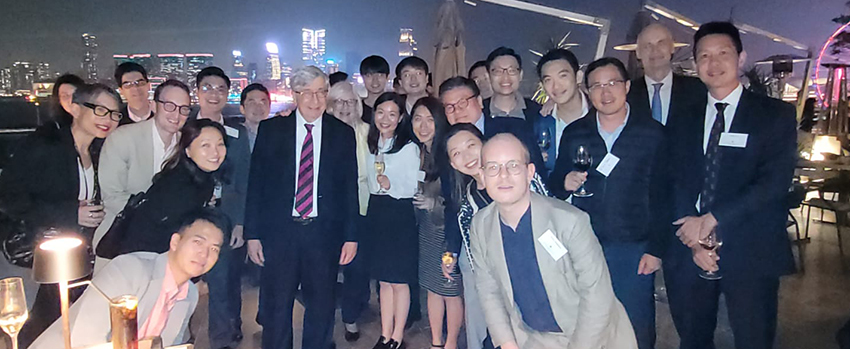Rector Trainor reviews events of Hilary Term 2023
Exeter’s Hilary Term proved very active, continuing the high, post-pandemic levels of sociability evident in Michaelmas. Every segment of the Exeter community contributed substantially.
Two events had an especially high profile. On 18 January the Indonesian Ambassador visited the College for a reception, which attracted more than a dozen current Exeter undergraduates and postgraduates from his country, and High Table. This event owed its existence to the connections of Exeter Fellow Professor Cath Green (Medical Genetics). In mid-February Exeter hosted, for a superbly sung Evensong and an especially lively High Table, the new Vice-Chancellor, Professor Irene Tracey, and her husband, Professor Myles Allen. As the mention of Evensong reminds me, the Chapel had a very full schedule of events during the recent term, including both the solemn (an appropriately sombre service on Holocaust Memorial Day) and the light-hearted, the annual pancake party on Shrove Tuesday.
Exeter students queued for pancakes that evening, and they proved enthusiastic participants in a wide range of activities throughout the term, including the festivals of Lunar New Year (22 January) and Burns Night a week later. Some of this activity was cultural, notably Exeter’s role in the annual Turl Street Arts Festival in February. Likewise many Exeter students had key roles in an Oxford production of ‘The Tempest’. Jennifer Kim (2022, MSt History of Art) won the Jon Stallworthy Poetry Prize, which attracted 90 postgraduate submissions, and her prize-winning Fine Art equivalent, Saba Qizilbash (2021, MFA) exhibited some of her work at Pembroke College.
In terms of social activities, undergraduates held their annual Halfway Hall on 10 February, and a fortnight later enthusiastically joined in the annual Families Dinner for second year students and their supporters, when Emma Little (2021, English) spoke for the students. Combining the social with the academic, many of the College’s graduate students brought their supervisors to Graduate High Table on 16 February, while several brave postgraduates entered the demanding Three Minute Thesis competition on 19 January, informing and entertaining an audience composed of students and alumni. Meanwhile, on 4 March at Cohen Quad many undergraduate volunteers played key roles in the offer holders’ day at Cohen Quad on 4 March, a major annual event linked to the major College priority of the further diversification of the student body.
Sport had an eventful term. The Women’s First Boat won their blades for the second successive Torpids; during the week all of Exeter’s boats achieved bumps and none suffered any. Vickie Fletcher (2021, English), President of the Boat Club, ably coxed (albeit in a losing cause) the University Women’s Lightweight Boat. Two Exonians will feature in the imminent Boat Race: former JCR President Ella Stadler (2019, History; 2022, MSc History of Science, Medicine and Technology) in the Blue Boat and Maria Nielsen-Scott (2018, Medicine) in the reserve boat. Exeter sport isn’t only for the elite: early in March there was a vigorous and well attended sports day, organised by the JCR, at Exeter’s sister college in Cambridge, Emmanuel. Sporting alumni as well as students should be encouraged by the Governing Body’s recent agreement in principle to join with Hertford College to renew the adjacent sports grounds at New Marston.

Members of Oxford University Women’s Boat Club development squad at Henley Women’s Regatta in 2022, Maria pictured far left and Ella next to her
The achievements of many of Exeter’s Fellows were on prominent display during the term. Supernumerary Fellow Professor Marian Knight received an MBE in the New Year Honours List for her contributions to maternal and public health. She also held her audience spellbound, at the annual subject family dinner for Medical and Life Sciences on 30 January, with a talk on the implications of research in her field for health equality for women. Three weeks later, at the subject family dinner for Mathematical and Physical Sciences, Professor Conall MacNiocaill (Earth Sciences), likewise commanded his audience’s attention with an analysis of the role of fossil fuel companies in progress to ‘net zero’.
Meanwhile, Professor Michael Osborne (Engineering) attracted national attention with his evidence, to a House of Commons committee, on artificial intelligence. The nature of the latter was the topic of a presentation to the Senior Common Room by Professor Daniel Cremers (Visiting Fellow; Technical University of Munich). During Hilary Term Professor Neil Herring (Pre-Clinical Medicine) rightly attracted attention for research, into a test for a stress hormone present in patients’ blood, that can save the lives of heart attack victims.
In terms of literature, there were three book launches by Fellows in College during Hilary Term: for books on French and Latin American literature respectively by Professor Jane Hiddleston and Dr Imogen Choi; for Shakespeare and Beckett: Restless Echoes (Cambridge University Press) by former Visiting Fellow Claudia Olk (Ludwig Maximilian University of Munich); and for Courting India: England, Mughal India and the Origins of Empire (Bloomsbury) by Professor Nandini Das (English). Meanwhile, Royal Literary Fund Fellow Simon Mason published The Broken Afternoon (Quercus), and Supernumerary Fellow Charles Foster’s book A Little Brown Sea (Fair Acre) reached the longlist for the Anglo-Hellenic League Runciman Award for the best book about Greece published during the year. Finally, I note the sparkling Toast to the Immoral Memory given on Burns Night by Dr Bill Zachs, a long-standing friend of the College, featuring quotes from an original letter by Burns which Bill brought to the Hall for the occasion.

Courting India: England, Mughal India and the Origins of Empire by Nandini Das
Exeter’s staff also play key roles in the College. Notable departures this term include Matthew Briggs and Jim Parker (after 24 years of service) from the Maintenance team and, from the Hall staff, Carol Barker, who retires after 34 years of devoted work for the College. Also, the children of staff as well as of Fellows and students participated in the colourful Nativity Pageant and lively subsequent lunch on 17 December.

Alumni from the late 1980s onwards will no doubt remember Carol Barker fondly and wish her well in retirement
Alumni, too, featured largely at Exeter just before and during Hilary Term. Many attended the first post-pandemic Winter City Drinks on 13 December at the headquarters of the British Olympic Association despite the national train strike that day. We were warmly welcomed there by BOA’s chief executive, Andy Anson (1983, Mathematics). There was also an excellent turnout at the Alumni Carol Concert later that week. During Hilary itself many Exonians attended the medics’ Bannister Society dinner (addressed by Oxford surgeon Nick Maynard [1980, Physiology]) on 27 January, and the lawyers’ Fortescue Society Dinner (addressed by Exeter Fellow Jonathan Herring) on 3 March. Likewise there was good alumni as well as student attendance at the now annual Football Dinner on 18 February. That event followed a match between alumni and current students which, I’m relieved to report, the latter won!
Alumni were also the centre of attention in mid-March during the first post-pandemic visits by myself, Marguerite and Development Director Yvonne Rainey to Singapore and Hong Kong. Well attended events were held in each location, with the Hong Kong event hosted by Martin Grosvenor (2006, English). Past students of the College will also be the focus of our forthcoming visit to the USA, including an Exeter event in New York on 12 April following the Vice Chancellor’s reception.

Rector Trainor and Director of Development Yvonne Rainey with alumni and friends of the College in Singapore (above) and (below) Rector Trainor with alumni in Hong Kong

In terms of recent alumni awards, I note especially the New Year Honours for Fiona Boulton (1985, PGCE), Executive Head of Guildford High School, OBE for services to education, and John Alpass (1964, Classics), MBE for services to the community in Surrey. It was also gratifying that Paul Paynter (1981, PPE) received a Queen Elizabeth II Platinum Jubilee Medal for volunteering and business services in Alberta. Meanwhile, Professor Tarunabh Khaitan (2004, BCL), Professor of Public Law and Head of Research at the Bonavero Institute of Human Rights in Oxford, was honoured with an India UK Achievers Award. There were also a number of substantial alumni publications detailed elsewhere in the latest edition of E-News.
Further alumni achievements included two College webinars by Honorary Fellows, each attracting close attention and many questions from their hybrid audiences. Former NATO Deputy Supreme Commander Sir Richard Shirreff (1974, Modern History) spoke on 22 January on ‘European security at a time of war in Europe: the reality behind the headlines’, and John Quelch CBE (1969, Modern History), Dean of the University of Miami School of Business, gave a presentation on 1 March on ‘Does American higher education hold the answers to major problems which UK universities are attempting to solve?’ I also note with pride the highly creditable performance of Exeter’s Celebrity University Challenge team – Reeta Chakrabarti (1984, English and French), Andy Anson, Sanchia Berg (1982, English) & Professor Alex Watson (1997, Modern History) – which reached the semi-finals and performed very well there.

The Exeter College Celebrity University Challenge team
I must, however, close my remarks about alumni on a very sad note with the news of the death of Murray Tobias (1961, BCL) AO, a highly distinguished Australian judge (New South Wales Court of Appeal) and a major contributor to fields such as human research ethics as well as to the Bench. Marguerite and I remember gratefully Murray’s warm hospitality during our College visit to Australia in 2015 and his recent appearance at an Exeter Gaudy.
I close with an update on the Library Project. It is proceeding very well. Completion is scheduled for September when many thousands of books will be moved back into the building in time for the start of term the following month. Much money for the project has been raised from alumni, and we in College are very grateful for that generosity. However, many naming opportunities remain, and further donations are required to prevent the College having to dip so far into its modest assets that future urgent capital projects are hindered. I am of course a biased witness on this subject, but I think it is clear that the restoration and renovation of this architectural gem, which serves central needs of Exeter’s students, is a very worthy cause, not least because it will provide additional reader spaces in an environment suited to 21st century learning. You can support the project by making a gift online or by contacting Adale Bennett, Deputy Director of Development and Alumni Relations.
Writing on a cool day in Oxford, I wish you all a pleasant spring – or, in the Southern Hemisphere, a pleasant autumn.
Rick Trainor
